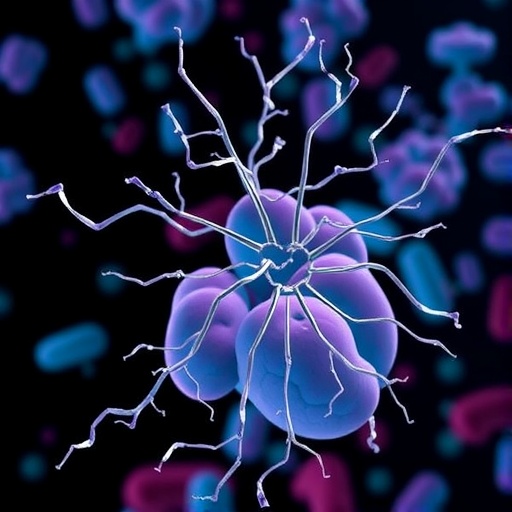In a groundbreaking study published in the journal International Microbiology, researchers led by Shamsuzzaman, M., alongside colleagues Choi, YJ., and Kim, S., delve into the intricate world of bacteriophages that specifically target extraintestinal clones of Escherichia coli, particularly ST131 and ST410. This research significantly enhances our understanding of phage biology and offers a promising approach to combating infections caused by these antibiotic-resistant bacteria.
The Escherichia coli species has long been known for its dual nature, which encompasses both harmless strains residing in the gut and pathogenic variants that can lead to severe infections. Among these, the ST131 and ST410 clones have become notorious for their ability to cause extraintestinal infections, including urinary tract infections and bloodstream infections. These strains pose considerable challenges, particularly in healthcare settings, due to their inherent antibiotic resistance.
Phages, or viruses that specifically infect bacteria, have gained traction as novel therapeutic agents in the fight against antibiotic-resistant infections. The concept of employing phages as a treatment modality is not entirely new; however, the detailed genomic characterization and analysis presented in this study open up new avenues for phage therapy applications. The researchers meticulously isolated and characterized a set of novel phages that exhibit a strong lytic activity against the ST131 and ST410 strains of E. coli.
One of the standout aspects of this research is the comprehensive genomic analysis performed on the newly identified phages. Genomic sequencing revealed unique traits that distinguish these phages from previously documented strains. The researchers employed state-of-the-art techniques to ensure a thorough characterization of the phage genome, which included examining the metabolic pathways, lytic enzymes, and potential resistance mechanisms present in the phage structure.
The findings indicate that these newly discovered phages possess a range of virulence factors that could enhance their efficacy in therapeutic applications. By understanding the genomic makeup of these phages, the scientists can predict their behavior in various environments, particularly within the human body. This knowledge is pivotal for developing effective phage therapy strategies that could not only treat existing infections but also prevent future outbreaks associated with these virulent E. coli clones.
Moreover, the study highlights the significance of biodiversity within bacteriophage populations. The researchers discovered a surprising variety of phage types, indicating that diverse phages can coexist and potentially target the same bacterial strain. This diversity can be advantageous in therapeutic contexts, as utilizing a cocktail of different phages may enhance treatment efficacy and reduce the likelihood of bacterial resistance development.
The implications of this research stretch beyond just academic interest; they signal a potential paradigm shift in how we approach the treatment of antibiotic-resistant infections. As antibiotic resistance continues to escalate globally, the development of phage therapy solutions becomes increasingly critical. The researchers advocate for further studies into their findings, emphasizing the need for clinical trials to assess the safety and efficacy of these phages in real-world settings.
Phage therapy can offer a personalized treatment approach, where specific phages are selected based on the infection profile of the individual patient. This contrasts sharply with broad-spectrum antibiotics, which often lead to dysbiosis and secondary infections. By harnessing the specificity of phages, microbial communities could potentially remain intact while effectively targeting the pathogenic strains.
In addition to therapeutic potential, this research underscores the importance of integrating phage technology into our existing healthcare frameworks. Regulatory frameworks will need to adapt to accommodate these novel therapies, ensuring that phage preparations are safe and effective for use in humans. Researchers stress that collaboration between microbiologists, clinicians, and regulatory bodies will be vital to navigate these challenges.
As we stand on the cusp of a potential phage therapy revolution, public awareness and education about bacteriophages must also improve. Patients, healthcare providers, and policymakers alike need to understand the benefits and limitations of phage therapy. By fostering an informed public dialogue, we can support the acceptance and integration of phage therapies as a complementary approach to antibiotic treatments.
In conclusion, the comprehensive study spearheaded by Shamsuzzaman et al. signals a significant stride toward understanding and harnessing bacteriophages against ST131 and ST410 E. coli infections. Their research marks a crucial step in the fight against antibiotic resistance, paving the way for future developments in phage therapy as a viable alternative or complement to current antibiotic treatments. The potential to turn the tide against resistant bacterial pathogens, utilizing the natural enemies of bacteria—bacteriophages—could redefine our strategies in infectious disease management.
As the battle against antibiotic resistance rages on, the prospect of utilizing phages offers hope, marking a newfound dimension in medical microbiology and treatment innovation. With continued research and development, the era of phage therapy could be upon us, ushering in a new chapter in infectious disease treatment.
Subject of Research: Characterization and genome analyses of novel phages targeting extraintestinal Escherichia coli clones ST131 and ST410.
Article Title: Characterization and genome analyses of the novel phages targeting extraintestinal Escherichia coli clones ST131 and ST410.
Article References: Shamsuzzaman, M., Choi, YJ., Kim, S. et al. Characterization and genome analyses of the novel phages targeting extraintestinal Escherichia coli clones ST131 and ST410. Int Microbiol (2025). https://doi.org/10.1007/s10123-025-00686-z
Image Credits: AI Generated
DOI: https://doi.org/10.1007/s10123-025-00686-z
Keywords: Bacteriophages, Escherichia coli, antibiotic resistance, phage therapy, genomic analysis, ST131, ST410, infectious disease.




